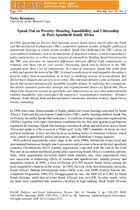| dc.contributor.author | Rousseau, Nicky | |
| dc.date.accessioned | 2021-06-21T13:05:04Z | |
| dc.date.available | 2021-06-21T13:05:04Z | |
| dc.date.issued | 2019 | |
| dc.identifier.citation | Rousseau, N. (2019). Speak out on poverty: Hearing, inaudibility, and citizenship in post-apartheid South Africa. Political and Legal Anthropology Review, 42(2), 210–225. https://doi.org/10.1111/plar.12315 | en_US |
| dc.identifier.issn | 1555-2934 | |
| dc.identifier.uri | https://doi.org/10.1111/plar.12315 | |
| dc.identifier.uri | http://hdl.handle.net/10566/6317 | |
| dc.description.abstract | In 1998, Speak Out on Poverty held hearings across South Africa shortly after the Truth and Reconciliation Commission (TRC) completed eighteen months of highly publicized, nationwide hearings at which victims testified. Speak Out challenged the TRC’s focus on overt political violations, seen to occlude forms of structural violence central to apartheid's policy and practice, as well as longer legacies of colonialism. Reading Speak Out alongside the TRC puts pressure on supposed differences between official truth commissions or tribunals and those run by civil society. Discussing Speak Out in relation to the TRC signaled more than a set of comparisons. In a time of transition, Speak Out spoke from within and against the noise of the TRC. It aimed to make poverty and inequality the nation's priority rather than reconciliation, or at least to challenge notions of reconciliation that did not have inequity and poverty at its center. | en_US |
| dc.language.iso | en | en_US |
| dc.publisher | WILEY | en_US |
| dc.subject | Poverty | en_US |
| dc.subject | South Africa | en_US |
| dc.subject | Citizenship | en_US |
| dc.subject | Post-apartheid | en_US |
| dc.subject | Truth and Reconciliation Commission (TRC) | en_US |
| dc.title | Speak out on poverty: Hearing, inaudibility, and citizenship in post-apartheid South Africa | en_US |
| dc.type | Article | en_US |

